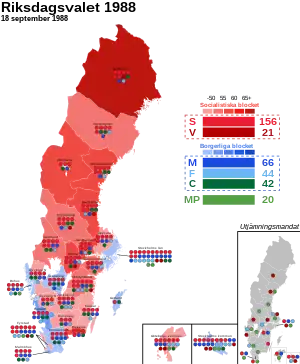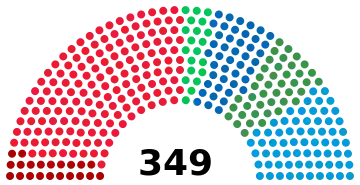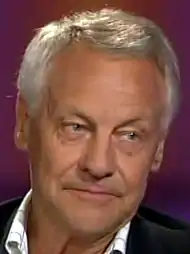| |||||||||||||||||||||||||||||||||||||||||||||||||||||||||||||||||||||||||||||
All 349 seats in the Riksdag 175 seats needed for a majority | |||||||||||||||||||||||||||||||||||||||||||||||||||||||||||||||||||||||||||||
|---|---|---|---|---|---|---|---|---|---|---|---|---|---|---|---|---|---|---|---|---|---|---|---|---|---|---|---|---|---|---|---|---|---|---|---|---|---|---|---|---|---|---|---|---|---|---|---|---|---|---|---|---|---|---|---|---|---|---|---|---|---|---|---|---|---|---|---|---|---|---|---|---|---|---|---|---|---|
| |||||||||||||||||||||||||||||||||||||||||||||||||||||||||||||||||||||||||||||
 Map of the election, showing the distribution of constituency and levelling seats, as well as the largest political bloc within each constituency. | |||||||||||||||||||||||||||||||||||||||||||||||||||||||||||||||||||||||||||||
| |||||||||||||||||||||||||||||||||||||||||||||||||||||||||||||||||||||||||||||
General elections were held in Sweden on 18 September 1988.[1] The Swedish Social Democratic Party remained the largest party in the Riksdag, winning 156 of the 349 seats.[2]
Results
 | |||||
|---|---|---|---|---|---|
| Party | Votes | % | Seats | +/– | |
| Swedish Social Democratic Party | 2,321,826 | 43.21 | 156 | –3 | |
| Moderate Party | 983,226 | 18.30 | 66 | –10 | |
| People's Party | 655,720 | 12.20 | 44 | –7 | |
| Centre Party | 607,240 | 11.30 | 42 | –1 | |
| Left Party Communists | 314,031 | 5.84 | 21 | +2 | |
| Green Party | 296,935 | 5.53 | 20 | +20 | |
| Christian Democratic Society Party | 158,182 | 2.94 | 0 | –1 | |
| Other parties | 36,559 | 0.68 | 0 | 0 | |
| Total | 5,373,719 | 100.00 | 349 | 0 | |
| Valid votes | 5,373,719 | 98.76 | |||
| Invalid/blank votes | 67,331 | 1.24 | |||
| Total votes | 5,441,050 | 100.00 | |||
| Registered voters/turnout | 6,330,023 | 85.96 | |||
| Source: Nohlen & Stöver | |||||
Seat distribution
| Constituency | Total seats |
Seats won | |||||||||
|---|---|---|---|---|---|---|---|---|---|---|---|
| By party | By coalition | ||||||||||
| S | M | F | C | V | MP | Left | Right | Others | |||
| Älvsborg North | 11 | 4 | 2 | 2 | 2 | 1 | 4 | 6 | 1 | ||
| Älvsborg South | 6 | 3 | 1 | 1 | 1 | 3 | 3 | ||||
| Blekinge | 6 | 4 | 1 | 1 | 4 | 2 | |||||
| Bohus | 12 | 5 | 2 | 2 | 1 | 1 | 1 | 6 | 5 | 1 | |
| Fyrstadskretsen | 20 | 9 | 5 | 2 | 1 | 1 | 2 | 10 | 8 | 2 | |
| Gävleborg | 12 | 6 | 1 | 1 | 2 | 1 | 1 | 7 | 4 | 1 | |
| Gothenburg | 19 | 7 | 4 | 3 | 1 | 2 | 2 | 9 | 8 | 2 | |
| Gotland | 2 | 1 | 1 | 1 | 1 | ||||||
| Halland | 11 | 4 | 2 | 2 | 2 | 1 | 4 | 6 | 1 | ||
| Jämtland | 5 | 3 | 1 | 1 | 3 | 2 | |||||
| Jönköping | 11 | 5 | 2 | 2 | 2 | 5 | 6 | ||||
| Kalmar | 10 | 5 | 2 | 1 | 2 | 5 | 5 | ||||
| Kopparberg | 12 | 6 | 1 | 1 | 2 | 1 | 1 | 7 | 4 | 1 | |
| Kristianstad | 12 | 5 | 3 | 1 | 2 | 1 | 5 | 6 | 1 | ||
| Kronoberg | 6 | 3 | 1 | 1 | 1 | 3 | 3 | ||||
| Malmöhus | 13 | 6 | 3 | 1 | 2 | 1 | 6 | 6 | 1 | ||
| Norrbotten | 10 | 6 | 1 | 1 | 1 | 1 | 7 | 3 | |||
| Örebro | 11 | 6 | 1 | 2 | 1 | 1 | 7 | 4 | |||
| Östergötland | 17 | 8 | 3 | 2 | 2 | 1 | 1 | 9 | 7 | 1 | |
| Skaraborg | 11 | 5 | 2 | 1 | 2 | 1 | 5 | 5 | 1 | ||
| Södermanland | 9 | 5 | 2 | 1 | 1 | 5 | 4 | ||||
| Stockholm County | 37 | 13 | 10 | 6 | 2 | 3 | 3 | 16 | 18 | 3 | |
| Stockholm Municipality | 30 | 10 | 8 | 5 | 1 | 4 | 2 | 14 | 14 | 2 | |
| Uppsala | 12 | 5 | 2 | 2 | 1 | 1 | 1 | 6 | 5 | 1 | |
| Värmland | 12 | 6 | 2 | 1 | 2 | 1 | 7 | 5 | |||
| Västerbotten | 10 | 5 | 1 | 1 | 2 | 1 | 6 | 4 | |||
| Västernorrland | 12 | 6 | 1 | 1 | 2 | 1 | 1 | 7 | 4 | 1 | |
| Västmanland | 10 | 5 | 2 | 1 | 1 | 1 | 6 | 4 | |||
| Total | 349 | 156 | 66 | 44 | 42 | 21 | 20 | 177 | 152 | 20 | |
| Source: Statistics Sweden | |||||||||||
By municipality
 Votes by municipality. The municipalities are the color of the party that got the most votes within the coalition that won relative majority.
Votes by municipality. The municipalities are the color of the party that got the most votes within the coalition that won relative majority. Cartogram of the map to the left with each municipality rescaled to the number of valid votes cast.
Cartogram of the map to the left with each municipality rescaled to the number of valid votes cast. Map showing the voting shifts from the 1985 to the 1988 election. Darker blue indicates a municipality voted more towards the parties that formed the centre-right bloc. Darker red indicates a municipality voted more towards the parties that form the left-wing bloc.
Map showing the voting shifts from the 1985 to the 1988 election. Darker blue indicates a municipality voted more towards the parties that formed the centre-right bloc. Darker red indicates a municipality voted more towards the parties that form the left-wing bloc. Votes by municipality as a scale from red/Left-wing bloc to blue/Centre-right bloc.
Votes by municipality as a scale from red/Left-wing bloc to blue/Centre-right bloc. Cartogram of vote with each municipality rescaled in proportion to number of valid votes cast. Deeper blue represents a relative majority for the centre-right coalition, brighter red represents a relative majority for the left-wing coalition.
Cartogram of vote with each municipality rescaled in proportion to number of valid votes cast. Deeper blue represents a relative majority for the centre-right coalition, brighter red represents a relative majority for the left-wing coalition.
References
This article is issued from Wikipedia. The text is licensed under Creative Commons - Attribution - Sharealike. Additional terms may apply for the media files.





.jpg.webp)
